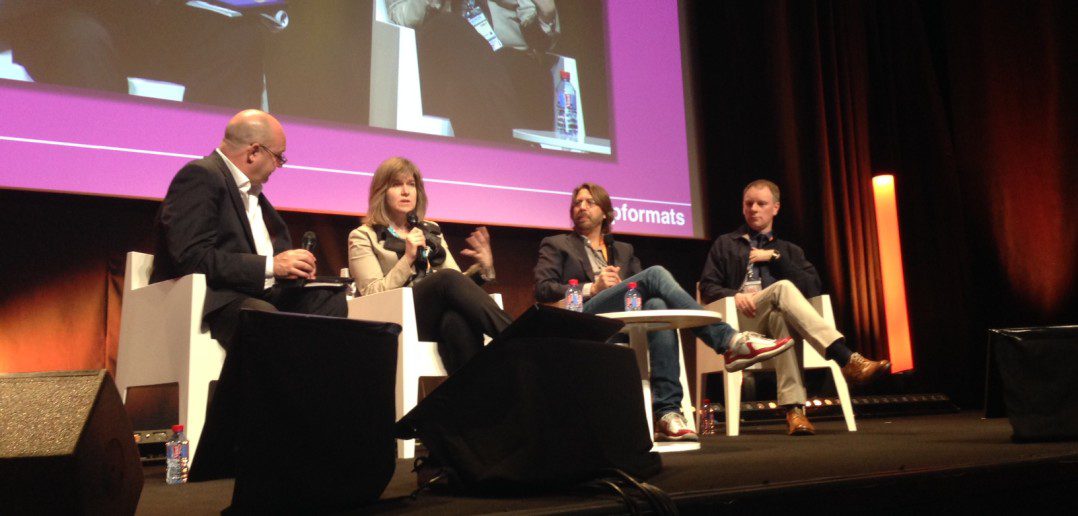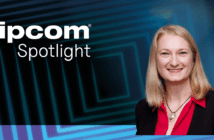Left to right: David Jenkinson, editor-in-chief and managing director, C21Media (moderator); Jennifer Dettman, executive director studio & unscripted content, Canadian Broadcasting Corporation; Calle Jansson, Channel Director, SBS Discovery TV; Alan Tyler, executive editor, entertainment commissioning, BBC.
Our panelists began by sharing what’s working well in their markets. CBC’s Dettman mentioned Dragon’s Den, which is performing well in the country. Asked by Jenkinson what « performing well » represents, she said that is around the 700,000 figure (viewership per week) in Canada.
Meanwhile, in Sweden, SBS’ Jansson lauded the merits of reality competitions. Top Chef and Just Desserts specifically work well, and his figures are about the same as Canada’s: 600,000-700,000 viewers is good. « We have added on the reality competition side. That really works. Also, workplace reality, and strong profiles that could pretty much do whatever lifestyle-related thing they want » work well too.
Finally, Tyler gave us a lesson on the BBC’s dispersed networks philosophy. « The important thing about BBC is to understand that BBC1, BBC2, BBC3, and BBC4 are very different channels. Each does something very bespoke, and as a whole that makes a holistic offering for us, » he said.
BBC1, for example, broadcasts big, mainstream formats « that unite the family », like The Voice, which averages 7-10 million viewers per week. And BBC2 is « intelligent pleasure », so things like Dragon’s Den work well there. « It did fantastic business: three million, » Tyler went on.
« The reason all those shows work is that they really understand the audience they’re speaking to. »
Jenkinson then asked panelists what they have in development.
In Canada, Dettman talked about original format Canada’s Smartest Person, « a value-add entertainment show that tests the theory of intelligence. » The format is « very participatory… so it’ll reach a broad audience. » That will likely appear in the fall. There’s also Banijay format Of All Places, a show about a comedian traveling to down-on-luck small towns in Canada. He learns their traditions and customs, then creates a standup routine about that town. It airs this winter.
« Part of our job as a public broadcaster is to unite the country in a sort of shared experience, » said Dettman.
In Sweden, physical competition is a big trend, said Call. « We used to be there with Wipeout of the World, and we’re taking a big step into that again, to unite families. Another thing coming up is scripted. We live in the dark 5-6 months in the year, so we tend to make up stories. So we’re taking our first step in the crime genre of scripted. » The upcoming crime show is called Hundred Code and « is a typical Swedish drama: dark, and quite violent, and very good, I would say. »
The BBC is taking You Against the Nation to pilot, said Tyler. In this format, « Contestants at home play contestants in the studio. If you play along with us, you’ll impact what’s happening in the studio. It’s risky, uncharted territory, and I think that’s what makes it exciting. It feels like something we should be trying. »
The BBC is also launching a show called Killer Magic. « They found a way to make street magic feel competitive … that made us look at magic in a slightly different way, » said Tyler.
He went on to say, « The more collaborative the development process, the better it is. The most dispiriting thing is to meet a commissioner or a controller who, within 5 seconds of your pitch starting, has already decided they don’t want to do that. Maybe it’s a cultural thing. »
Asked about their plans for multi-platform development, Dettman admitted, « The type of content we create doesn’t do so well with binge viewing. It’s just not how people consuming it. But the content we create on the unscripted side is more participatory. »
She went on, « I tell every producer, gone are the days when you just think about the time slot you’re pitching for. You have to think about a 360° experience. If you want us to commission it, that’s what it needs to be. »
Tyler was a little more cautious. « We have to be careful in this space. The temptation is to do everything on lots of different platforms, but audiences are really smart. What they look for is veracity and integrity. Is it absolutely integral to the offer? If it is, I think it’s gonna be well received. » He referred to You Against the Nation, which « absolutely requires cross-platform engagement. »
At this point an audience member asked whether the producers are paid extra for the extra effort they make to produce a cross-platform strategy.
« We don’t tend to compartmentalise our budgets that way, » Tyler conceded, « It will all be one development costs. » However, cross-platform efforts will be reflected in that funding.
Jansson said SBS isn’t quite where it wants to be in terms of digital integration. « We’re a bad example. It’s hard to collaborate; we’re looking into that. You need to integrate » digital in terms of money and decision-making.
Dettman was more bullish: « We’re integrated and have a big interactive team that we’d assign as part of the process for the producer. We have funding, all sorts of digital funds and experimental funds, that producers can tap. »
It was Dettman, too, who explained how commissioners should read the work they get from producers: « You have to use your gut. Stop and listen and imagine, ‘is this what I’d like to see?' »
« I absolutely agree, » said Tyler. « I don’t think we should lose sight of that heart. »
Jansson admonished the audience to « be open-minded, listen to everything. » For SBS, young families are especially important to target, and he issued a challenge: « We’d like to have the next big thing. We will be aggressive and I hope that I wake up 12 months from now to see myself with something big, something number one-ish. »




